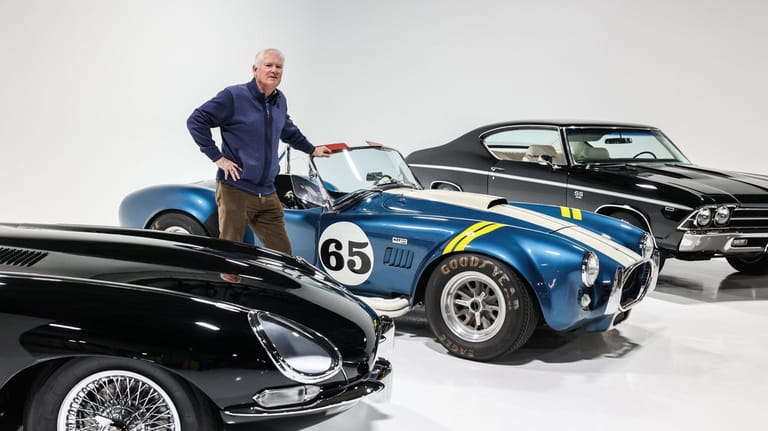Dealer of vintage cars in Farmingdale steers customers to classics while adapting to the times

Back in the late '60s, a young Will Branston was already captivated by collectible, vintage and luxury cars.
“It’s genetic,” Branston, 68, said.
His father, a World War II Navy pilot who became a Grumman engineer, had brought back an MG from England, and together, the two generations fixed the sports car in their Northport garage. Eventually, the elder Branston replaced the import with a 1965 Mustang, which he later sold to his son for $250.
“All through high school, I worked on that,” said Branston.
AT A GLANCE
Motorcar Classics Inc., Farmingdale
CEO, founder and owner: Will Branston
Established: 2016
Employees: 17
Number of 2023 car sales: “in the hundreds”
Average selling price: $350,000
A graduate of Long Island University, he navigated a 30-year career in finance, including a decade owning a hedge fund, which allowed Branston to pursue his passion during global business travels: collecting fancy vintage autos, including Porsches and Ferraris.
“I would send them home, and my wife, Patricia, would call and say, ‘There’s a car in the driveway,’ ” said Branston.
In 2000, he sold the hedge fund and, in ensuing years, ran specialty car businesses with partners. In 2016, Branston founded and became sole owner of Motorcar Classics Inc.
Today, his venture encompasses a 25,000-square-foot Farmingdale headquarters, which includes offices, a showroom and a 60,000-square-foot Melville facility for storing, servicing, detailing and photographing the cars. They generally sell for $25,000 to $5 million.
A fortune cookie message taped to his computer sums up Branston's life motto: “Do what you love.” He recently spoke to Newsday about his business. Answers were edited for space and clarity.
What does the firm do?
Our primary business is buying exotic cars, which are those produced in limited quantities, such as BMWs, Ferraris and Porsches from the 1950s and 1960s, and collectible cars (which are historically significant for their technology or prominent designer). We also have hundreds of newer cars, which are a year or two old.
Where do you find inventory?
I’ve been in business long enough that people with big collections call me.
What about auctions?
We track auctions to see what cars are going up or down in value, but not to buy. A car sitting in an auction may have mechanical issues or a Ford with a Chevy motor, and you don’t know what you’re getting. Before buying a car, you need to touch, feel and drive it, and have someone knowledgeable inspect it.
How has the business changed?
It’s a global industry, which wasn’t the case 30 years ago, and we sell around the world, with 25% of our business international, including the Middle East and South America.
Also, millennials are driving the market now and, unlike previous generations, many don’t know how to drive a stick shift, so they want it replaced with an automatic transmission. They also want colder air-conditioning, better radios and interiors, and different suspensions for a softer ride. These cars are called restomods (as in restored and modified). But in making the car more contemporary, we try to keep the exterior intact.
Do restomods hurt a car’s value?
Ten to 15 years ago, it could diminish its value by 50%. Now, it can increase it by 50% to 100%. A customer isn’t going to buy a $5 million Ferrari without creature comforts. But the whole collectible market is very strong.
Recently, an unmodified car went for twice its listed $1 million price — which isn’t unusual when several customers are in a room and want the same thing.

Branston with a 1963 Jaguar, a Shelby Cobra, and a 1969 Chevrolet Chevelle at the warehouse in Melville. Credit: Newsday/Steve Pfost
What drives people to collect cars?
Many of my customers are big collectors with exquisite paintings and sculptures in their homes, and a garage of vintage cars is just as important to them. For someone who has a 30- to -100-car collection, it’s not just an investment but a passion. And having the ability to walk into your collection and drive it makes it fun to own.
Who’s your target market?
We have customers from all walks of life, and someone buying a 1960s Volvo for $25,000 is just as important as someone buying a $5 million or $10 million car from me.
Why so inclusive for exclusive products?
As a kid, I just wanted to look at the cars at (a luxury showroom] but would be shooed away unless I was accompanied by my mother or father. So since starting my business, I have wanted people to come in and make it a family experience — and to look at their faces seeing things they’ve only seen in books.
It’s also about relationships. The 15-year-old with a rock band might have since founded a very successful computer company worth $50 million. And he comes now to buy, remembering how we let him sit in a car.
Biggest challenge?
Finding knowledgeable people to do mechanical work and restorations. The boomers, who are now in their 60s and 70s, no longer do this work. And people coming out of automobile schools rely on computers for repairs, which doesn’t help.
What makes the cars so photogenic on your website?
They’re multi-dimensional art forms. Our photographer sets them in our photo booth, which is a white room with no angles and corners, so it looks as though they’re floating in the picture.
What do you drive?
Right now, a 1965 Shelby Cobra is my favorite. It’s American-made, and I love the history of its creator, Carroll Shelby, and the car’s look, sound and speed. It checks all the boxes for me.
